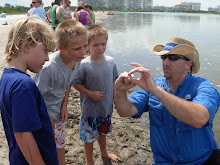 These days accountability is a key trait required for any organization (particularly public ones) to justify their existence in providing services to their stakeholders. The Florida Sea Grant College Program (FSGCP) is no different. Recently the program underwent a comprehensive site review by a National Sea Grant Site Review Team (SRT). The SRT focused the review and discussion on how well the FSGCP met the three broad SRT categories: 1) Organization and Management of the Program; 2) Stakeholder Engagement; and 3) Collaborative Network Activities.
These days accountability is a key trait required for any organization (particularly public ones) to justify their existence in providing services to their stakeholders. The Florida Sea Grant College Program (FSGCP) is no different. Recently the program underwent a comprehensive site review by a National Sea Grant Site Review Team (SRT). The SRT focused the review and discussion on how well the FSGCP met the three broad SRT categories: 1) Organization and Management of the Program; 2) Stakeholder Engagement; and 3) Collaborative Network Activities.While the site review does not obviously just refer to my work, it is a reflection of the type of performance and service provided by my other Sea Grant colleagues around the state, and I wanted to share some of the findings. I hope this information provides a little more insight into how Florida Sea Grant operates to ensure it remains relevant to the stakeholders it serves across the state and region.
...Care is taken to ensure that FSGCP research is relevant to coastal constituent needs and involves
extension and outreach. Engagement with stakeholders starts with the development of their four year
strategic plan (most recently for 2009-2013). The Strategic Plan is developed once every four years and starts with an issues survey completed by Advisory Committees of individual county-based extension agents and Florida residents (including more than a thousand coastal business owners, elected officials, and residents for the 2009-2013 cycle), and a two-day planning workshop attended by all members of the FSGCP Advisory Council, educators, university and agency scientists, resource managers, extension specialists and agents, and representatives from a variety of coastal business sectors (over 80 participants for the 2009-2013 cycle). In addition to participating in the planning workshop, the FSGCP Advisory Council works with the leadership team to development the final drafts of the Strategic and Implementation Plans.
The FSGCP prioritizes their RFP for research, based on their FSGCP Strategic Plan objectives and a relevancy review. The process starts with strategic priority research topics drawn from those identified in the Strategic Plan. In addition to requiring that projects address these priorities, the Program ensures relevance of the research portfolio: pre-proposals are screened by industry and agency experts; researchers are required to work with end-users in developing research proposals; and full proposals must contain a detailed outreach plan. Most projects engage a marine extension agent to assist in developing the required outreach component of the project plan. All these efforts result in research partnerships between university faculty and either specific private sector end users or resource management agencies. The linkage between research
investigators and stakeholders was very good in selected areas presented during the review. The FSGCP Communication produces materials to assist extension staff in engaging with coastal stakeholders. Research findings are primarily communicated by meetings, workshops, the FSGCP website, Program Highlights documents, newsletters and other written materials to convey coastal and marine-related information to stakeholders. Research findings are translated into these communications output and provided to extension personnel, the National Sea Grant Library, and the public. In terms of PDF downloads from the National Sea Grant Library, the FSGCP leads the Sea Grant Network (~170,000 downloads of FSGCP documents in 2009). New methods of information delivery, such as social media (e.g., YouTube and Facebook) are increasing exposure for the Program as a source of reliable, science-based information. Just as important are the many personal contacts through office visits, telephone calls, and letters. These 8 often are initiated by a broad range of people who have come to rely on the FSGCP for unbiased information.Relevance
The FSGCP Extension Program is providing valuable and relevant services to a broad range of Florida constituents. Coastal constituents direct the activities of every FSGCP marine extension agent. Each agent has his/her own unique advisory committee of 10 to 20 members that represent the coastal region in which they serve (e.g., local business leaders, mayors, county commissioners, federal and state agency representatives, educators, non-profits). Most extension agents are housed in their respective county extension offices, and report to that host office, to the FSGCP, and to IFAS Extension. Inter-weaving activities and reporting among these interests, each agent prepares an annual Plan of Work that is based on local needs, yet consistent with FSGCP priorities. During an annual planning retreat of all FSGCP extension agents and specialists with the leadership team, a coordinated, programmed team approach is accomplished.
To keep communication lines open, a quarterly newsletter and Work Action Teams on topical areas, such as sustainable fishes, artificial reefs, seafood safety, aquaculture, education, and boating and waterway management, are a primary means for development and implementation of statewide extension projects. One issue that was not made clear during the visit is how county agents provide feedback to state level on programs; presumably, the Work Action Teams allow for this.
The FSGCP Program has a powerful approach for engaging coastal constituents. Formal procedures ensure that research, communications, education and extension work together to transfer research to coastal stakeholders and that research is relevant to stakeholder needs.
The Program is active in network activities, with nationally and internationally recognized expertise, including seafood safety and economics, boating and waterway management, and sutainable aquaculture and fisheries. The interaction between the FSGCP and NOAA programs is laudable.
If you would like to see the full site review report, email me at fluech@ufl.edu




No comments:
Post a Comment